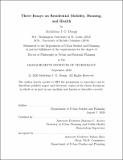| dc.contributor.advisor | Mariana C. Arcaya. | en_US |
| dc.contributor.author | Daepp, Madeleine I. G.(Madeleine Isabelle Gorkin) | en_US |
| dc.contributor.other | Massachusetts Institute of Technology. Department of Urban Studies and Planning. | en_US |
| dc.date.accessioned | 2021-01-05T23:16:21Z | |
| dc.date.available | 2021-01-05T23:16:21Z | |
| dc.date.copyright | 2020 | en_US |
| dc.date.issued | 2020 | en_US |
| dc.identifier.uri | https://hdl.handle.net/1721.1/129066 | |
| dc.description | Thesis: Ph. D. in Urban and Regional Planning, Massachusetts Institute of Technology, Department of Urban Studies and Planning, September, 2020 | en_US |
| dc.description | Cataloged from student-submitted PDF of thesis. | en_US |
| dc.description | Includes bibliographical references (pages 107-121). | en_US |
| dc.description.abstract | Over 700,000 people moved for health reasons in the last year, and many more moved for reasons in which health was implicated, such as to escape climate hazards. Changes in the extent to which a residence promotes health should change housing prices--an important health and social exposure in its own right, as well as a mechanism through which numerous other features of a place are reshaped--yet the relationships between residential mobility, health, and housing markets remain poorly understood. This dissertation comprises three papers on the association of residential mobility with health and housing. In the first paper, I evaluate the effect of a localized change in healthcare access--the 2006 Massachusetts Healthcare Reform--on housing prices and interstate migration along the state border. | en_US |
| dc.description.abstract | I find an increase in the prices of affordable housing that is offset by a commensurate decrease in the price of luxury housing; I also observe a small increase in migration into Massachusetts versus into neighboring states. My second paper seeks to better understand the effects of climate migration on housing markets. Examining the impacts of displacement due to Hurricane Katrina, I show that housing prices decreased in destination neighborhoods that received the largest numbers of movers, relative to neighborhoods that did not receive large inflows. Effects are larger in predominantly Black destination neighborhoods than in predominantly White destination neighborhoods. I also find larger effects in places that received more economically disadvantaged movers relative to similar neighborhoods that received more advantaged movers. | en_US |
| dc.description.abstract | My third paper describes a collaboration with the Healthy Neighborhoods Study Consortium, for whom I constructed a data set of estimated moving flows between Massachusetts neighborhoods. I then created a web-based app to make the resulting estimates accessible to planners, community organizations, and residents. An overarching theme of this work is the recognition that communities share housing and health challenges with the places to which former residents move and the places from which new residents arrive. | en_US |
| dc.description.statementofresponsibility | by Madeleine I. G. Daepp. | en_US |
| dc.format.extent | 121 pages | en_US |
| dc.language.iso | eng | en_US |
| dc.publisher | Massachusetts Institute of Technology | en_US |
| dc.rights | MIT theses may be protected by copyright. Please reuse MIT thesis content according to the MIT Libraries Permissions Policy, which is available through the URL provided. | en_US |
| dc.rights.uri | http://dspace.mit.edu/handle/1721.1/7582 | en_US |
| dc.subject | Urban Studies and Planning. | en_US |
| dc.title | Three Essays on residential mobility, housing, and health | en_US |
| dc.type | Thesis | en_US |
| dc.description.degree | Ph. D. in Urban and Regional Planning | en_US |
| dc.contributor.department | Massachusetts Institute of Technology. Department of Urban Studies and Planning | en_US |
| dc.identifier.oclc | 1227049027 | en_US |
| dc.description.collection | Ph.D.inUrbanandRegionalPlanning Massachusetts Institute of Technology, Department of Urban Studies and Planning | en_US |
| dspace.imported | 2021-01-05T23:16:19Z | en_US |
| mit.thesis.degree | Doctoral | en_US |
| mit.thesis.department | UrbStud | en_US |
